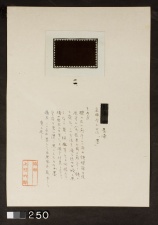Difference between revisions of "Kunugi (Oak) - center (250 C)"
Jump to navigation
Jump to search
m (MDerrick moved page Kunugi - center (250 C) to Kunugi (Oak) - center (250 C) without leaving a redirect) |
|||
| Line 24: | Line 24: | ||
|- | |- | ||
! scope="row"|Dye (English common name) | ! scope="row"|Dye (English common name) | ||
| − | | Acorn | + | | Oak (Acorn) |
|- | |- | ||
! scope="row"|Dyestuff (botanical name) | ! scope="row"|Dyestuff (botanical name) | ||
Latest revision as of 12:45, 23 June 2020
| Museum number | 250 |
|---|---|
| Uemura number / title | ; "Haze-some 25" |
| Folder location | 4th shelf |
| Sample location | center (250 C) |
| Fiber type | cotton |
| Color | brownish black |
| Dyestuff (Japanese common name) | 櫟 : Kunugi |
| Dye (English common name) | Oak (Acorn) |
| Dyestuff (botanical name) | Quercus acutissima Carruth. |
| Plant part | bark / dried (?) |
| Dyestuff extraction | boiled in water |
| Auxiliary agent in dye bath | - |
| Mordant | iron |
| Other auxiliary agent | ash water (separate bath) |
| Uemura's notes | The dyeing process was : 1) dye bath; 2) iron mordant bath; 3) ash water; 4) dye bath; and 5) iron mordant bath. By repeating this process, the resultant color would darken into black. The resultant color would be same when dyed with chestnut tree and oak tree, as well as wood and fruit from Quercus acutissima Carruth. |
| Uemura's date | Kyoto |
